PATHO 370 (PATHO 370)
West Coast University
Page 4 out of 186 results
Sort by
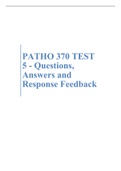
-
PATHO 370 TEST 5 - Questions, Answers and Response Feedback
- Exam (elaborations) • 17 pages • 2023
-
Available in package deal
-
- $13.99
- + learn more
Question 1 0.125 out of 0.125 points At his most recent clinic visit, a patient with end-stage renal disease is noted to have edema, congestive signs in the pulmonary system, and a pericardial friction rub. Appropriate therapy at this time would include Selected Answer: b. initiation of dialysis. Correct Answer: b. initiation of dialysis. Response Feedback: Dialysis is the appropriate therapy at end-stage renal disease. Although fluid restriction may be appropriate at some point in renal failure...
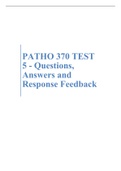
-
PATHO 370 TEST 5 - Questions, Answers and Response Feedback
- Exam (elaborations) • 17 pages • 2023
-
Available in package deal
-
- $13.99
- + learn more
Question 1 0.125 out of 0.125 points At his most recent clinic visit, a patient with end-stage renal disease is noted to have edema, congestive signs in the pulmonary system, and a pericardial friction rub. Appropriate therapy at this time would include Selected Answer: b. initiation of dialysis. Correct Answer: b. initiation of dialysis. Response Feedback: Dialysis is the appropriate therapy at end-stage renal disease. Although fluid restriction may be appropriate at some point in renal failure...
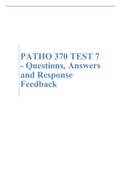
-
PATHO 370 TEST 7 - Questions, Answers and Response Feedback
- Exam (elaborations) • 18 pages • 2023
-
Available in package deal
-
- $14.49
- + learn more
Question 1 0.125 out of 0.125 points Risk factors for hemorrhagic stroke include Selected Answer: d. acute hypertension. Correct Answer: d. acute hypertension. Response Feedback: Intracerebral hemorrhage is a hemorrhage within the brain parenchyma and usually occurs in the context of severe and often longstanding hypertension. Risk factors for stroke are similar to those for other atherosclerotic vascular disease. Cardiac disease complicated by atrial fibrillation is an important risk factor for...
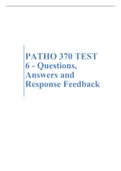
-
PATHO 370 TEST 6 - Questions, Answers and Response Feedback
- Exam (elaborations) • 18 pages • 2023
-
Available in package deal
-
- $14.49
- + learn more
• Question 1 0.125 out of 0.125 points The finding of hypotension, rigid abdomen, and absent bowel sounds in a patient with pancreatitis Selected Answer: a. indicates peritonitis with substantial risk for sepsis and shock. Correct Answer: a. indicates peritonitis with substantial risk for sepsis and shock. Response Feedback: In acute pancreatitis, fever is common but is usually low-grade initially. In more severe pancreatitis, hypotension, rigid abdomen, and absent bowel sounds are present. Hy...
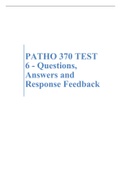
-
PATHO 370 TEST 6 - Questions, Answers and Response Feedback
- Exam (elaborations) • 18 pages • 2023
-
Available in package deal
-
- $14.49
- 1x sold
- + learn more
• Question 1 0.125 out of 0.125 points The finding of hypotension, rigid abdomen, and absent bowel sounds in a patient with pancreatitis Selected Answer: a. indicates peritonitis with substantial risk for sepsis and shock. Correct Answer: a. indicates peritonitis with substantial risk for sepsis and shock. Response Feedback: In acute pancreatitis, fever is common but is usually low-grade initially. In more severe pancreatitis, hypotension, rigid abdomen, and absent bowel sounds are present. Hy...
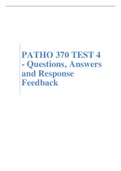
-
PATHO 370 TEST 4 - Questions, Answers and Response Feedback
- Exam (elaborations) • 18 pages • 2023
-
Available in package deal
-
- $14.49
- 1x sold
- + learn more
D. D. is a 66 year-old female suffering from shortness of breath. She smoked 2 packs a day until she quit 2 years ago. She has a history of bronchiolitis, hyperinflated lungs, pulmonary edema, and syncope. Her primary care practitioner suspects she also has pulmonary hypertension (PH). After examination, D. D. has a PAP of 35mmHg and mild CHF. Citing scholarly resources, answer the following questions: 1. What is pulmonary hypertension and how could D. D. have developed PH? In healthy lungs, the...
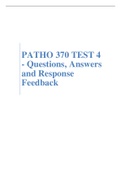
-
PATHO 370 TEST 4 - Questions, Answers and Response Feedback
- Exam (elaborations) • 18 pages • 2023
-
Available in package deal
-
- $14.49
- + learn more
D. D. is a 66 year-old female suffering from shortness of breath. She smoked 2 packs a day until she quit 2 years ago. She has a history of bronchiolitis, hyperinflated lungs, pulmonary edema, and syncope. Her primary care practitioner suspects she also has pulmonary hypertension (PH). After examination, D. D. has a PAP of 35mmHg and mild CHF. Citing scholarly resources, answer the following questions: 1. What is pulmonary hypertension and how could D. D. have developed PH? In healthy lungs, the...
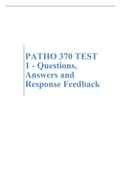
-
PATHO 370 TEST 1 - Questions, Answers and Response Feedback
- Exam (elaborations) • 32 pages • 2023
-
Available in package deal
-
- $15.49
- + learn more
All the following stress-induced hormones increase blood glucose except Selected Answer: c. aldosterone. Correct Answer:c. aldosterone. Response Feedback: Aldosterone results in water and sodium retention and potassium loss in the urine. It does not affect blood glucose. Cortisol is a glucocorticoid secreted by the adrenal cortex. Cortisol stimulates gluconeogenesis in the liver, thus increasing blood glucose. Norepinephrine inhibits insulin secretion, thus increasing blood sugar. Epinephrine ...
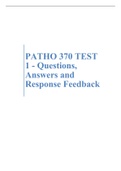
-
PATHO 370 TEST 1 - Questions, Answers and Response Feedback
- Exam (elaborations) • 32 pages • 2023
-
Available in package deal
-
- $15.49
- + learn more
All the following stress-induced hormones increase blood glucose except Selected Answer: c. aldosterone. Correct Answer:c. aldosterone. Response Feedback: Aldosterone results in water and sodium retention and potassium loss in the urine. It does not affect blood glucose. Cortisol is a glucocorticoid secreted by the adrenal cortex. Cortisol stimulates gluconeogenesis in the liver, thus increasing blood glucose. Norepinephrine inhibits insulin secretion, thus increasing blood sugar. Epinephrine ...
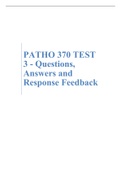
-
PATHO 370 TEST 3 - Questions, Answers and Response Feedback
- Exam (elaborations) • 19 pages • 2023
-
Available in package deal
-
- $14.49
- + learn more
Question 1 0.125 out of 0.125 points Administration of which therapy is most appropriate for hypovolemic shock? Selected Answer: c. Crystalloids Correct Answer: c. Crystalloids Response Feedback: Crystalloids are solutions that contain electrolytes. Isotonic solutions, such as lactated Ringers, are commonly used crystalloid solutions. These solutions are preferred for volume resuscitation, because they remain in the extracellular space and are more effective in increasing blood volume. Vasoconst...

Did you know that on average a seller on Stuvia earns $82 per month selling study resources? Hmm, hint, hint. Discover all about earning on Stuvia


